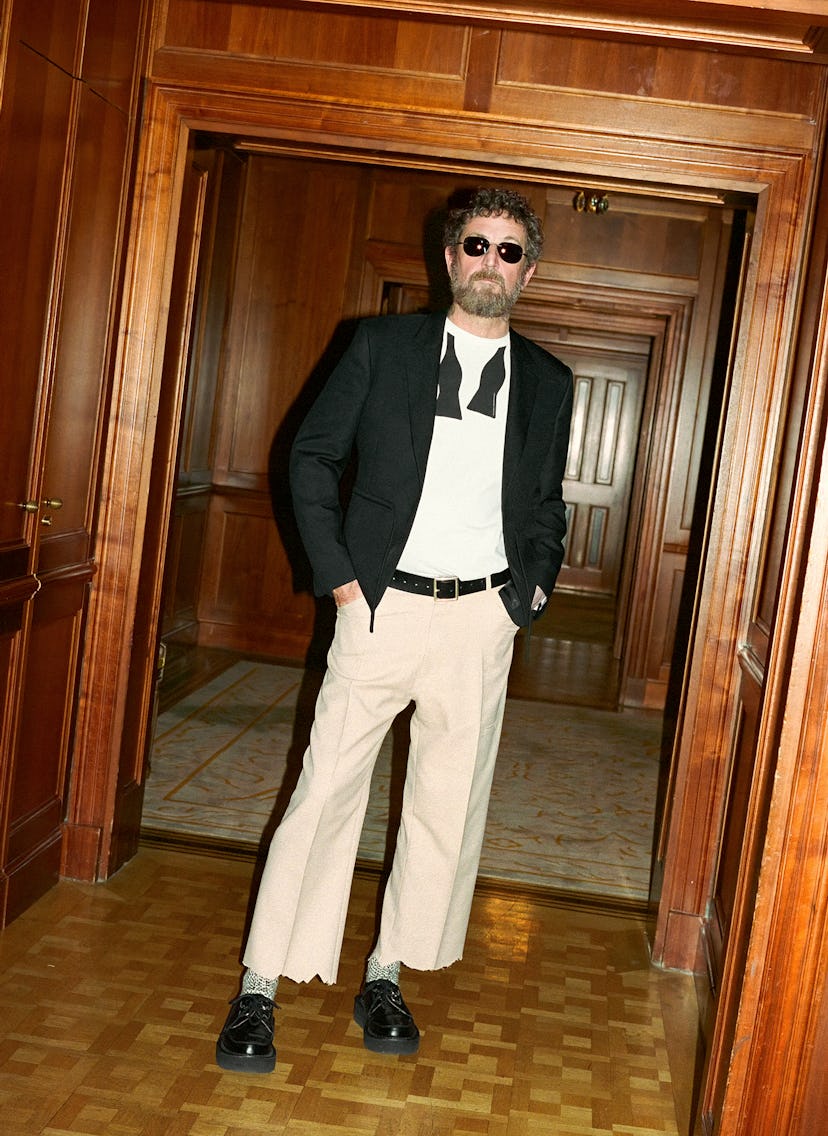
You started your career by interning for Cerruti in 1982, at age 17, and then worked at Armani and Prada. In 2000, you went to Yves Saint Laurent, and in 2004 you became the creative director for eight years. Then there was a three-year head designer role at Zegna. You were 51 when you stepped down. What was it like coming of age while working in fashion?
I considered it a beautiful journey. Only a few people get to work for 40 years at something that they really like. That said, if you are a creative person or a designer, you put a lot of yourself into what you do. My personality and my character were defined by my profession, instead of a more intimate knowledge of myself. Today I can say that I know myself professionally and as an adult.
After you left Zegna, you took a beat and resurfaced in Berlin, promoting Random Identities, your genderless, seasonless, menswear-inspired line. How did it feel to reenter the fashion world on your terms?
It was, and is, freedom. Before, my job was translating other people’s dreams, strategies, or achievements. Random Identities is a different side of myself, and that’s why I see it more purely. I want to make fashion accessible. Of course, there are other complications, such as being self-funded.
Your recent Zara collection was a big hit on TikTok. You have a lot of fans there now who might not have known of you before. How does that feel?
I try to navigate social media in a very organic way. I never had an obsession with growing followers. How my work is received is more important than how I look or what I do.
Some TikTokers have dubbed you the #bestdressedhuman.
I’m touched when I see young kids who know my work. The other night, at a party, someone came to me and said, “I wanted to let you know that you’re my all-time favorite.” And I was like, “What do you mean?” [Laughs] I’m always very surprised and act out with a joke.
Self-deprecation goes a long way. But seeing you on the runway or in lookbooks for brands like Louis Vuitton, GmbH, and Anonymous Club is exciting. Younger designers look up to you.
I am a fashion person, so I pay attention to everything. This relates to my approach to the young generation. I had mentors, but there was always authority and hierarchy. I was very close to Miuccia Prada. I was very close to Tom Ford, at YSL, but it was more work than anything. I now have friends who are 20 or 25 years younger than me, and I realize that you don’t even know what you want at that age. There is a lack of communication between generations, and if others work in the same industry as I do, I will establish a form of support. When you establish that level of conversation, the age or experience gap disappears.
How has living in Berlin helped you creatively?
Berlin is not a fashion capital, and it’s not a show-off city. It allowed me to get rid of that sense of superficiality I find in fashion.
Would you ever want to lead a fashion house again?
Whatever I answer would get me in trouble. I don’t want to pronounce myself.
Random Identities is inspired partly by the people you met in Berlin. Do you enjoy going to nightclubs?
When I moved here, I felt freer than ever. I never had time to go out before—I had responsibilities. When I first came to Berlin, even if I was going out, I would be home by 1 or 2 a.m. And then I had to remind myself, Well, what do you have to do tomorrow? Nothing. So I had to work on this because I always felt I needed to earn the right to go out. During that first year and a half, two years in Berlin when I didn’t work, I was planning Random Identities. I also traveled with my partner.
The notion of fame and freedom has come up a lot in our chat. I’m curious about the “Freedom of Behavior” tattoo on your forehead. How does that relate?
I thought I would never change my hairstyle, and I liked the idea of having something on my forehead that nobody would see. I wrote “Freedom of Behavior” because I like my work, but also there’s nothing wrong with being in a club with a drink and staying up until five. I believe that, and I needed to symbolize it. It’s a nice reminder.
Grooming by Maria Ehrlich for Tom Ford Beauty. Special thanks to Hotel Adlon Kempinski Berlin.